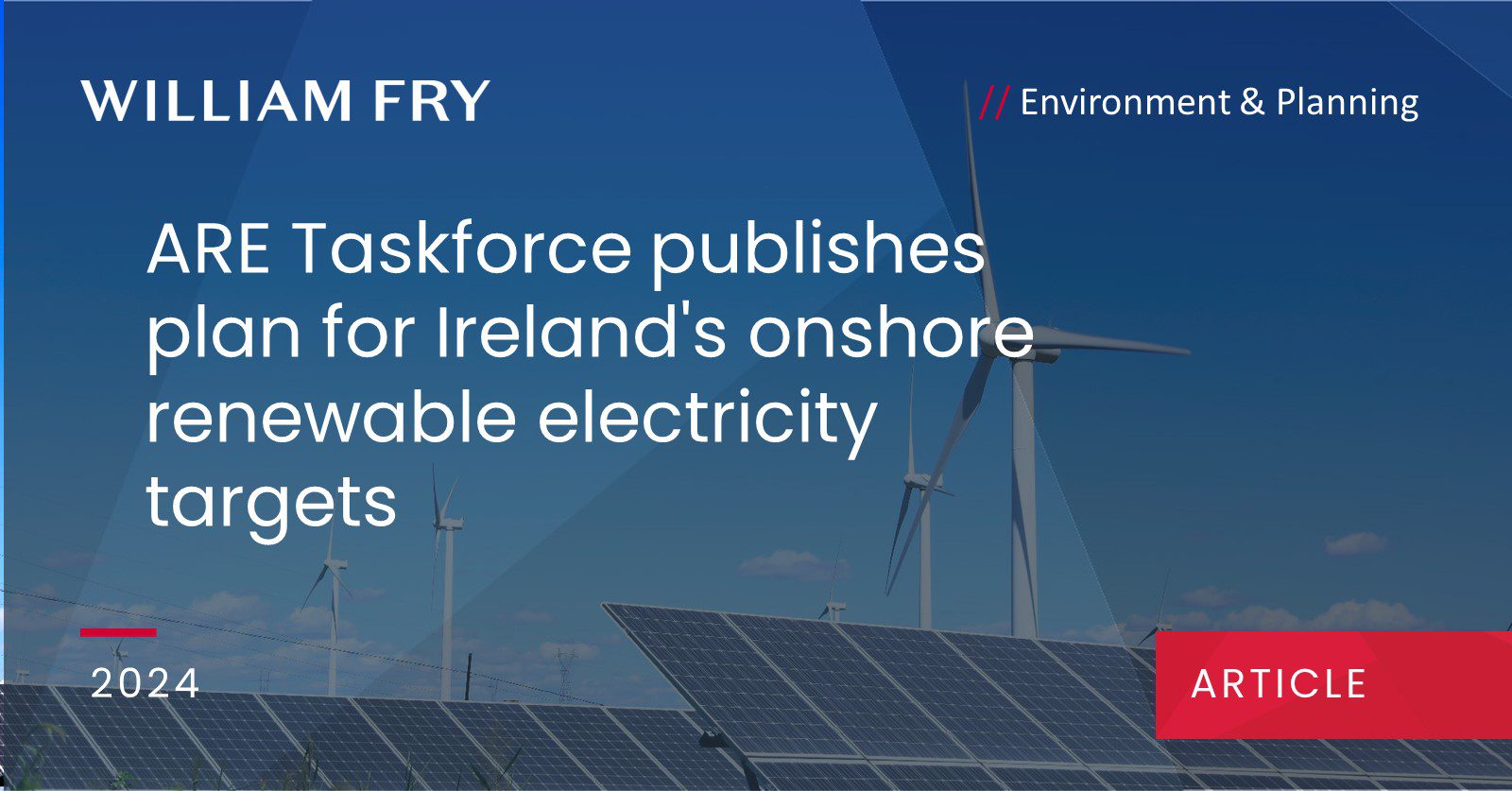The Accelerating Renewable Electricity (ARE) Taskforce has published its Implementation Plan to support Ireland’s achievement of its onshore renewable electricity targets by 2030.
The ARE Taskforce is comprised of Government departments (including DECC and DETE) and State bodies (including EirGrid and CRU) that are key to delivering Ireland’s energy transition. Under the Climate Action Plan 2023 and subsequent Climate Action Plan 2024 (CAP 24), the Government has set the ambitious target of producing more than 80% of Ireland’s electricity from renewable sources by 2030. To achieve this ambitious goal, the Government has targeted, among other measures, implementing 9 GW of onshore wind capacity (c.4.5GW in 2023) and 8 GW of solar PV capacity (currently c.1GW) by 2030. See our coverage of CAP24 and the electricity sector here.
The ARE Taskforce was established to help achieve these ambitious onshore generation capacity targets by identifying, coordinating and prioritising key supporting policies and removing or minimising barriers to implementing those policies.
The Implementation Plan
The Implementation Plan identifies nearly 70 actions, many of which are already underway, that are vital to ensuring delivery of 80% renewable electricity by 2030. The ARE Taskforce has identified three pillars integral to renewables delivery across which those actions are being and will be taken and each pillar will have three working groups operating under it. These working groups will each contain members from across the relevant departments and State bodies to ensure an integrated approach to planning and delivery.
The three pillars are:
- Planning and Reporting;
- Grid and Storage; and
- Route to Market.
Planning and Reporting
The working groups that will operate under this pillar are: Planning Legislation and Regulation; Planning Policy; and Delivery and Reporting.
Key objectives for this pillar include:
- ensuring the planning code is compliant with RED III (the EU’s most recent update to the Renewable Energy Directive);
- issuing the long-awaited revised draft Wind Energy Development Guidelines / National Planning Statement; and
- identifying potential and available land necessary for renewable energy development to meet the 2030 renewable energy target, in accordance with Article 15b of RED III.
Grid and Storage
The working groups that will operate under this pillar are: Future Grid; Connection Policy and Implementation; and Storage and System Services.
Key objectives for this pillar include:
- publication of a successor connection policy to ECP-2;
- accelerating the delivery/development of the onshore electricity grid; and
- removal of operational constraints to accommodate 95% SNSP (i.e. intermittent renewable share of electricity production) by 2030.
Route to Market
The working groups that will operate under this pillar are: Small Scale Route to Market; Finance and Investment; and Large-Scale Route to Market.
Key objectives for this pillar include:
- achieving 2.5GW of non-grid solar by 2030 and defining non-grid solar to support delivery of this target;
- ensuring a successor scheme for the Renewable Electricity Support Scheme (RESS) is in place by 2025; and
- ensuring key policy decisions are informed by financing considerations.
Future Working Group Objectives
The Implementation Plan will be updated periodically and it highlights a series of potential future objectives for the ARE Taskforce, including the:
- introduction of competitive daily auctions for system services by the end of 2026;
- implementation of the Net Zero Industry Act; and
- development of Solar Energy Development Guidelines / National Planning Statement.
The Delivery Plan – Annex I
The Implementation Plan includes a delivery plan at Annex I, which sets out milestones and timelines for the various working groups for the objectives set out in the Implementation Plan. The delivery plan indicates that the significant majority of milestones will be achieved within the relevant deadlines.
Conclusion
The Implementation Plan is key to addressing barriers to the timely delivery of onshore renewable energy generation, in particular in the area of planning and permitting. It also addresses the urgent need to align local policies with national climate and renewable electricity targets as well as the upgrading and build out of the electricity grid.
By facilitating the accelerated delivery of onshore wind and solar energy and supporting infrastructure, the Implementation Plan will support Ireland’s renewables industry and reduce the country’s emissions in line with its statutory obligations.
The ARE Taskforce Implementation Plan is available at www.gov.ie.




